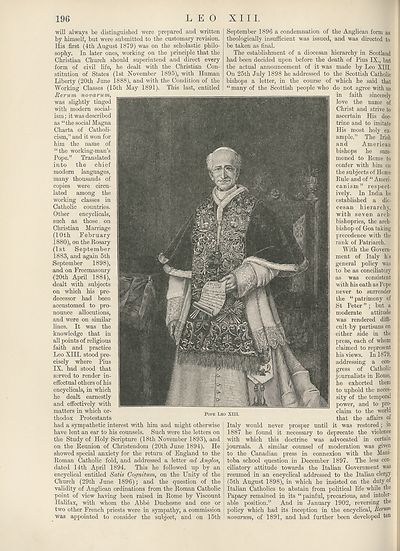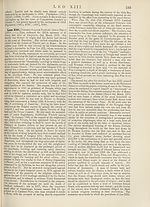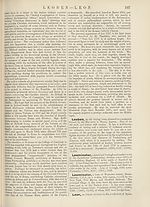New volumes of the Encyclopædia Britannica > Volume 30, K-MOR
(224) Page 196
Download files
Complete book:
Individual page:
Thumbnail gallery: Grid view | List view

196
LEO XIII.
will always be distinguished were prepared and written
by himself, but were submitted to the customary revision.
His first (4th August 1879) was on the scholastic philo¬
sophy. In later ones, working on the principle that the
Christian Church should superintend and direct every
form of civil life, he dealt with the Christian Con¬
stitution of States (1st November 1895), with Human
Liberty (20th June 1888), and with the Condition of the
Working Classes (15th May 1891). This last, entitled
Rerum novarum,
was slightly tinged
with modern social¬
ism ; it was described
as “the social Magna
Charta of Catholi¬
cism,” and it won for
him the name of
“ the working-man’s
Pope.” Translated
into the chief
modern languages,
many thousands of
copies were circu¬
lated among the
working classes in
Catholic countries.
Other encyclicals,
such as those on
Christian Marriage
(10th February
1880), on the Rosary
(1st September
1883, and again 5th
September 1898),
and on Freemasonry
{20th April 1884),
dealt with subjects
on which his pre¬
decessor had been
accustomed to pro¬
nounce allocutions,
and were on similar
lines. It was the
knowledge that in
all points of religious
faith and practice
Leo XIII. stood pre¬
cisely where Pius
IX. had stood that
served to render in¬
effectual others of his
encyclicals, in which
he dealt earnestly
and effectively with
matters in which or¬
thodox Protestants
had a sympathetic interest with him and might otherwise
have lent an ear to his counsels. Such were the letters on
the Study of Holy Scripture (18th November 1893), and
on the Reunion of Christendom (20th June 1894). He
showed special anxiety for the return of England to the
Roman Catholic fold, and addressed a letter ad Anglos,
dated 14th April 1894. This he followed up by an
encyclical entitled Satis Gognitum, on the Unity of the
Church (29th June 1896); and the question of the
validity of Anglican ordinations from the Roman Catholic
point of view having been raised in Rome by Viscount
Halifax, with whom the Abbe Duchesne and one or
two other French priests were in sympathy, a commission
was appointed to consider the subject, and on 15th
Pope Leo XIII.
September 1896 a condemnation of the Anglican form as
theologically insufficient was issued, and was directed to
be taken as final.
The establishment of a diocesan hierarchy in Scotland
had been decided upon before the death of Pius IX., but
the actual announcement of it was made by Leo XIII.
On 25th July 1898 he addressed to the Scottish Catholic
bishops a letter, in the course of which he said that
“ many of the Scottish people who do not agree with us
in faith sincerely
love the name of
Christ and strive to
ascertain His doc¬
trine and to imitate
His most holy ex¬
ample.” The Irish
and American
bishops he sum¬
moned to Rome to
confer with him on
the subjects of Home
Rule and of “ Ameri-
canism” respect¬
ively. In India he
established a dio¬
cesan hierarchy,
with seven arch¬
bishoprics, the arch¬
bishop of Goa taking
precedence with the
rank of Patriarch.
With the Govern¬
ment of Italy h:s
general policy was
to be as conciliatory
as was consistent
with his oath as Pope
never to surrender
the “patrimony of
St Peter ”; but a
moderate attitude
was rendered diffi¬
cult by partisans on
either side in the
press, each of whom
claimed to represent
his views. In 1879,
addressing a con¬
gress of Catholic
journalists in Rome,
he exhorted them
to uphold the neces¬
sity of the temporal
power, and to pro¬
claim to the world
that the affairs of
Italy would never pjrosper until it was restored; in
1887 he found it necessary to deprecate the violence
with which this doctrine was advocated in certain
journals. A similar counsel of moderation was given
to the Canadian press in connexion with the Mani¬
toba school question in December 1897. The less con¬
ciliatory attitude towards the Italian Government was
resumed in an encyclical addressed to the Italian clergy
(5th August 1898), in which he insisted on the duty of
Italian Catholics to abstain from political life while the
Papacy remained in its “painful, precarious, and intoler¬
able position.” And in January 1902, reversing the
policy which had its inception in the encyclical, Rerv/m
novarum, of 1891, and had further been developed ten
LEO XIII.
will always be distinguished were prepared and written
by himself, but were submitted to the customary revision.
His first (4th August 1879) was on the scholastic philo¬
sophy. In later ones, working on the principle that the
Christian Church should superintend and direct every
form of civil life, he dealt with the Christian Con¬
stitution of States (1st November 1895), with Human
Liberty (20th June 1888), and with the Condition of the
Working Classes (15th May 1891). This last, entitled
Rerum novarum,
was slightly tinged
with modern social¬
ism ; it was described
as “the social Magna
Charta of Catholi¬
cism,” and it won for
him the name of
“ the working-man’s
Pope.” Translated
into the chief
modern languages,
many thousands of
copies were circu¬
lated among the
working classes in
Catholic countries.
Other encyclicals,
such as those on
Christian Marriage
(10th February
1880), on the Rosary
(1st September
1883, and again 5th
September 1898),
and on Freemasonry
{20th April 1884),
dealt with subjects
on which his pre¬
decessor had been
accustomed to pro¬
nounce allocutions,
and were on similar
lines. It was the
knowledge that in
all points of religious
faith and practice
Leo XIII. stood pre¬
cisely where Pius
IX. had stood that
served to render in¬
effectual others of his
encyclicals, in which
he dealt earnestly
and effectively with
matters in which or¬
thodox Protestants
had a sympathetic interest with him and might otherwise
have lent an ear to his counsels. Such were the letters on
the Study of Holy Scripture (18th November 1893), and
on the Reunion of Christendom (20th June 1894). He
showed special anxiety for the return of England to the
Roman Catholic fold, and addressed a letter ad Anglos,
dated 14th April 1894. This he followed up by an
encyclical entitled Satis Gognitum, on the Unity of the
Church (29th June 1896); and the question of the
validity of Anglican ordinations from the Roman Catholic
point of view having been raised in Rome by Viscount
Halifax, with whom the Abbe Duchesne and one or
two other French priests were in sympathy, a commission
was appointed to consider the subject, and on 15th
Pope Leo XIII.
September 1896 a condemnation of the Anglican form as
theologically insufficient was issued, and was directed to
be taken as final.
The establishment of a diocesan hierarchy in Scotland
had been decided upon before the death of Pius IX., but
the actual announcement of it was made by Leo XIII.
On 25th July 1898 he addressed to the Scottish Catholic
bishops a letter, in the course of which he said that
“ many of the Scottish people who do not agree with us
in faith sincerely
love the name of
Christ and strive to
ascertain His doc¬
trine and to imitate
His most holy ex¬
ample.” The Irish
and American
bishops he sum¬
moned to Rome to
confer with him on
the subjects of Home
Rule and of “ Ameri-
canism” respect¬
ively. In India he
established a dio¬
cesan hierarchy,
with seven arch¬
bishoprics, the arch¬
bishop of Goa taking
precedence with the
rank of Patriarch.
With the Govern¬
ment of Italy h:s
general policy was
to be as conciliatory
as was consistent
with his oath as Pope
never to surrender
the “patrimony of
St Peter ”; but a
moderate attitude
was rendered diffi¬
cult by partisans on
either side in the
press, each of whom
claimed to represent
his views. In 1879,
addressing a con¬
gress of Catholic
journalists in Rome,
he exhorted them
to uphold the neces¬
sity of the temporal
power, and to pro¬
claim to the world
that the affairs of
Italy would never pjrosper until it was restored; in
1887 he found it necessary to deprecate the violence
with which this doctrine was advocated in certain
journals. A similar counsel of moderation was given
to the Canadian press in connexion with the Mani¬
toba school question in December 1897. The less con¬
ciliatory attitude towards the Italian Government was
resumed in an encyclical addressed to the Italian clergy
(5th August 1898), in which he insisted on the duty of
Italian Catholics to abstain from political life while the
Papacy remained in its “painful, precarious, and intoler¬
able position.” And in January 1902, reversing the
policy which had its inception in the encyclical, Rerv/m
novarum, of 1891, and had further been developed ten
Set display mode to:
![]() Universal Viewer |
Universal Viewer | ![]() Mirador |
Large image | Transcription
Mirador |
Large image | Transcription
Images and transcriptions on this page, including medium image downloads, may be used under the Creative Commons Attribution 4.0 International Licence unless otherwise stated. ![]()
| Encyclopaedia Britannica > New volumes of the Encyclopædia Britannica > Volume 30, K-MOR > (224) Page 196 |
|---|
| Permanent URL | https://digital.nls.uk/193570413 |
|---|
| Attribution and copyright: |
|
|---|---|
| Shelfmark | EB.18 |
|---|---|
| Description | Ten editions of 'Encyclopaedia Britannica', issued from 1768-1903, in 231 volumes. Originally issued in 100 weekly parts (3 volumes) between 1768 and 1771 by publishers: Colin Macfarquhar and Andrew Bell (Edinburgh); editor: William Smellie: engraver: Andrew Bell. Expanded editions in the 19th century featured more volumes and contributions from leading experts in their fields. Managed and published in Edinburgh up to the 9th edition (25 volumes, from 1875-1889); the 10th edition (1902-1903) re-issued the 9th edition, with 11 supplementary volumes. |
|---|---|
| Additional NLS resources: |
|

